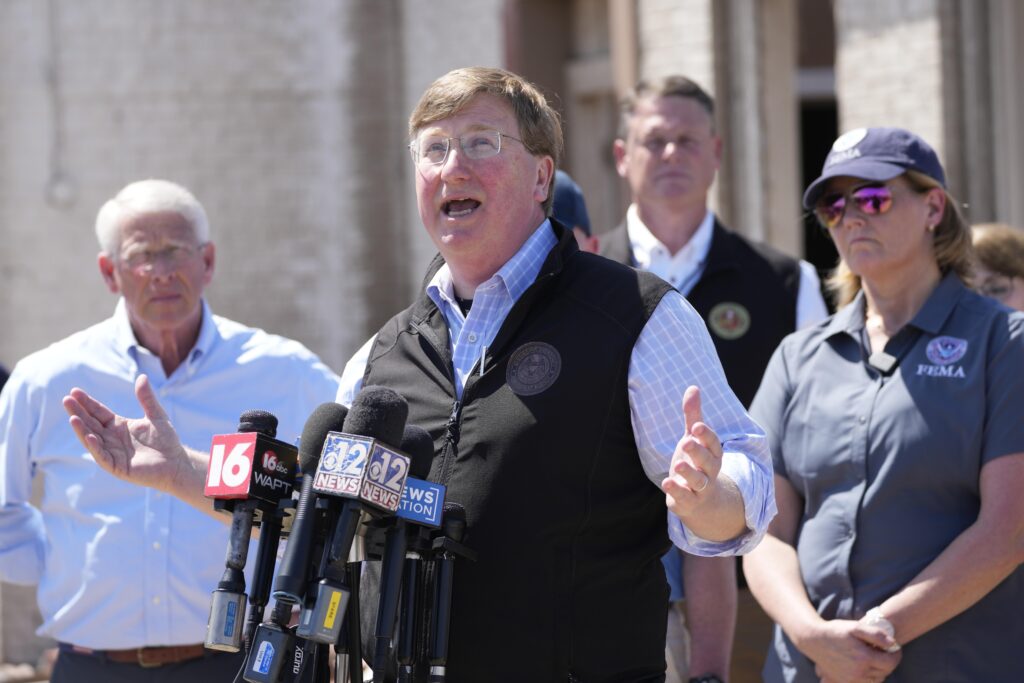
Governor Reeves says it’s “business as usual” despite talk of changes at FEMA
How did your country report this? Share your view in the comments.
Diverging Reports Breakdown
Governor Reeves says it’s “business as usual” despite talk of changes at FEMA
Despite talk of changes at the Federal Emergency Management Agency (FEMA), Governor Tate Reeves (R) recently stated that should disaster strike Mississippi this hurricane season, he believes it will be “business as usual.” President Donald Trump said FEMA will remain operational until the end of the 2025 hurricane season. After that, he wants his administration to “wean off of FEMA and we want to bring it down to the state level,” said Reeves. Former Mississippi Governor Phil Bryant was sworn in last month as the vice chairman of the President’s FEMA Review Council. He, along with other members such as Texas Governor Greg Abbott and Virginia Governor Glenn Youngkin, are tasked with recommending changes to the federal agency. Possible funding during natural disasters could come from HUD and the Small Business Administration.
Reeves said he is positive that Mississippi can handle any changes that may occur at the federal agency.
Despite talk of changes at the Federal Emergency Management Agency (FEMA), Governor Tate Reeves (R) recently stated that should disaster strike Mississippi this hurricane season, he believes it will be “business as usual.”
Hurricane season began on June 1 and runs until November 30.
Mississippi partners with other states through an Emergency Management Assistance Compact, allowing governors to request aid during an emergency. Additionally, there is the Stafford Act, which is designed so emergency responses are managed by states, worked locally, but supported by the federal government.
During a recent press conference, Governor Reeves said, “Too many states have depended solely on the federal government, and that’s not going to be the case anymore.”
“There might not be a FEMA agency [in the future], but there is also going to be an effort to consolidate some of the programs,” he added.
Reeves said he is positive that Mississippi can handle any changes that may occur should FEMA’s role be reduced or the agency eliminated.
“We need to know the rules of the game and we’ll navigate through that,” the Governor said. “I’m confident that the way things ultimately turn out, there is going to be a way that we can respond.”
The federal government is not leaving the emergency management business, said Reeves. Possible funding during natural disasters could come from HUD and the Small Business Administration.
Recently, President Donald Trump (R) said FEMA will remain operational until the end of the 2025 hurricane season. After that, he wants his administration to “wean off of FEMA and we want to bring it down to the state level.”
Former Mississippi Governor Phil Bryant (R) was sworn in last month as the vice chairman of the President’s Federal Emergency Management Agency (FEMA) Review Council. He, along with other members such as Texas Governor Greg Abbott (R) and Virginia Governor Glenn Youngkin (R), are tasked with recommending changes to the federal agency.
Bryant told Magnolia Tribune, “As a former governor who has on-the-ground experience working with FEMA, I hope to bring a state and local perspective to what should be the federal response.”
He added that the goal of the FEMA Review Council is to have a more effective response for people when they have their worst day.
The Mississippi Emergency Management Agency (MEMA) did not comment on the President’s statement but said as of now, “nothing has changed.”
“In fact, right now we’re dealing with the March 14-15 storms, where there are some 300 personnel from FEMA now in our state helping survivors in our state recover from those storms. Nothing has changed, everything is moving forward as it has and will continue to be until somebody actually changes the rules,” the agency said in a statement.
The 2025 Atlantic Hurricane Season is expected to be above normal, with forecasters expecting 13 to 19 named storms, 6 to 10 hurricanes, and 3 to 5 major hurricanes, according to NOAA.
